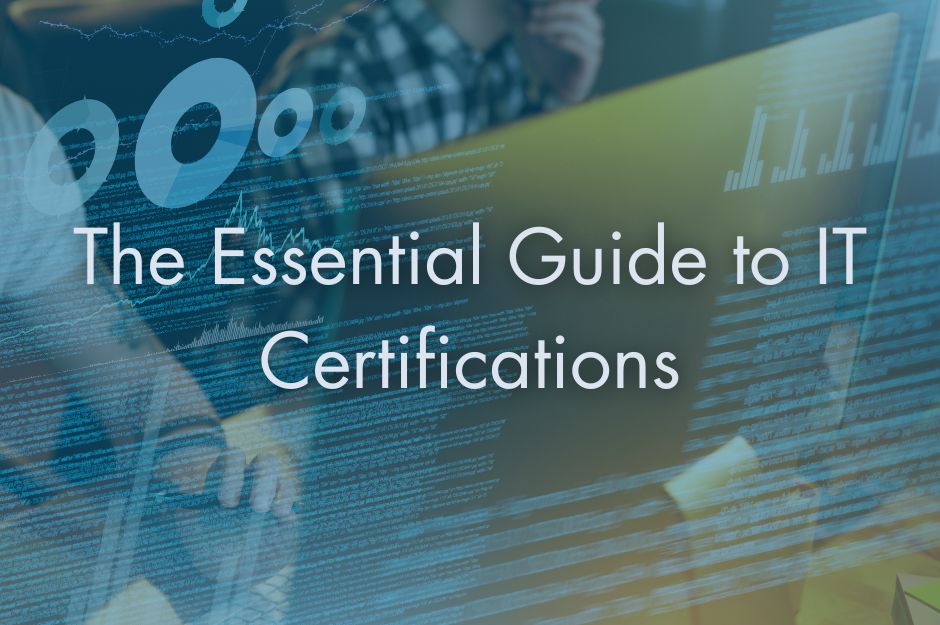The Essential Guide to IT Certifications: Understanding Acronyms, Qualifications, and Career Paths
In the ever-evolving field of Information Technology, certifications play a crucial role in validating your skills and expertise. They not only enhance your resume but also open doors to better career opportunities. However, with a myriad of certifications available, it can be challenging to keep track of what each acronym stands for and what it signifies.
Beyond understanding the acronyms, deciding what certification is most relevant to your career goals and which certification you qualify for can also be a challenge. Knowing the CBKs for these certifications can help. CBK, or Common Body of Knowledge, refers to the knowledge and skills that a professional must understand to be certified in a particular field. Each CBK serves as the foundation for the respective certification exams. CBKs ensure that certified professionals possess the necessary knowledge and skills to perform their roles effectively.
In the 2024 edition of our Salary Survey Guide, ESP has provided a list of the most in-demand certifications in the IT industry this year on a national scale. This guide aims to demystify some of the most common IT certifications, their acronyms, and their meanings. We’ll help you choose the certification that best suits your skills and career goals.
1. AWS: Amazon Web Services Certified Solutions Architect – Associate
With a focus on cloud architecture, this certification validates expertise in designing and deploying scalable, highly available, and fault-tolerant systems on AWS. It covers architectural best practices, AWS services, and how to design and deploy robust cloud solutions.
- Target Audience: Solutions architects, cloud engineers, and developers aiming to build and deploy applications on AWS.
- Career Path: Positions you as a qualified cloud architect and opens opportunities in cloud-based roles.
- CBKs: Design Resilient Architectures, Design High-Performing Architectures, Design Secure Applications and Architectures, Design Cost-Optimized Architectures
2. CDPSE: Certified Data Privacy Solutions Engineer
Focusing on Data Privacy Engineering, the CDPSE certification validates your ability to implement privacy by design, ensuring data protection and compliance across the lifecycle of IT systems. It covers privacy governance, architecture, and lifecycle management.
- Target Audience: IT professionals, data engineers, and privacy consultants focused on integrating privacy into their organization’s products and services.
- Career Path: Data privacy, leading to roles like Data Privacy Officer or Consultant.
- CBKs: Privacy Governance, Privacy Architecture, Data Lifecycle Management
3. CCSP: Certified Cloud Security Professional
This Cloud Security certification is designed for IT and information security leaders who wish to demonstrate their expertise in securing cloud environments. It covers cloud architecture, governance, risk management, compliance, and security operations.
- Target Audience: Security professionals working with cloud technologies, cloud architects, and consultants.
- Career Path: Cloud security; an increasingly important field as more organizations migrate to cloud platforms.
- CBKs: Cloud Concepts, Architecture, and Design, Cloud Data Security, Cloud Platform and Infrastructure Security, Cloud Application Security, Cloud Security Operations, Legal, Risk, and Compliance
4. CDP: Certified Data Professional
A certification focused on Data Management and Analytics, covering a broad range of data management disciplines such as data governance, data warehousing, data integration, and data quality. The CDP certification allows professionals to specialize in areas such as business analytics, data governance, and more.
- Target Audience: Data professionals, data analysts, and data scientists looking to validate their expertise in data management and analytics.
- Career Path: Various data-related roles; versatility in the field of data management and analytics.
- CBKs: Data Management, Data Integration, Data Analytics, Database Management
5. CEH: Certified Ethical Hacker
Focusing on Ethical Hacking and Penetration Testing, the CEH certification demonstrates your skills in identifying and addressing vulnerabilities in IT systems through ethical hacking. It covers hacking tools, methodologies, and techniques.
- Target Audience: IT security professionals, penetration testers, and system administrators interested in ethical hacking.
- Career Path: Cybersecurity; particularly in roles focused on ethical hacking, vulnerability assessment, and penetration testing.
- CBKs: Ethical Hacking Basics, Footprinting and Reconnaissance, Scanning Networks, Enumeration, System Hacking, Malware Threats, Social Engineering, Denial of Service (DoS) Attacks, Session Hijacking, Evading IDS, Firewalls, and Honeypots
6. CISM: Certified Information Security Manager
A certification in Security Management, CISM is aimed at management-level professionals responsible for overseeing an organization’s information security program. It covers information risk management, incident management, and security governance.
- Target Audience: Information security managers, IT consultants, and risk managers.
- Career Path: Managing and governing enterprise-level information security, leading to leadership roles in IT security.
- CBKs: Information Security Governance, Information Risk Management, Information Security Program Development and Management, Information Security Incident Management
7. CISA: Certified Information Systems Auditor
With a focus on IT Auditing and Control, a CISA certification demonstrates your skills in auditing, controlling, and ensuring IT and business systems. It covers auditing processes, governance, and information systems acquisition, development, and maintenance.
- Target Audience: IT auditors, compliance officers, and security professionals involved in IT governance.
- Career Path: IT auditing and control, compliance, governance, and risk management.
- CBKs: Information System Auditing Process, Governance and Management of IT, Information Systems Acquisition, Development, and Implementation, Information Systems Operations and Business Resilience, Protection of Information Assets
8. CISSP: Certified Information Systems Security Professional
This Information Security certification is globally recognized for IT security professionals and covers a comprehensive range of topics including security and risk management, asset security, and security engineering.
- Target Audience: Security analysts, IT directors, and consultants focused on information security management.
- Career Path: Information security; leading to senior roles like Chief Information Security Officer (CISO).
- CBKs: Security and Risk Management, Asset Security, Security Architecture and Engineering, Communication and Network Security, Identity and Access Management (IAM), Security Assessment and Testing, Security Operations, Software Development Security
9. CRISC: Certified in Risk and Information Systems Control
Focused on IT Risk Management, CRISC certifies professionals in identifying and managing enterprise IT risk and implementing information systems controls. It covers risk identification, assessment, mitigation, and monitoring.
- Target Audience: Risk management professionals, IT auditors, and control managers.
- Career Path: IT risk management and control, leading to leadership roles in risk management.
- CBKs: IT Risk Identification and Assessment, Risk Response and Mitigation, Risk Control, Monitoring and Reporting
10. CSM: Certified ScrumMaster
A certification focused in Agile Project Management, validating your knowledge of the Scrum framework and ability to apply agile practices in project management. It covers Scrum roles, events, artifacts, and how to guide a team in using Scrum.
- Target Audience: Project managers, developers, and team leaders involved in agile projects.
- Career Path: Certified Scrum practitioner, ideal for roles in agile project management and team leadership.
- CBKs: Scrum Framework, Scrum Roles, Agile Principles, Facilitation and Coaching, Servant Leadership Continuous Improvement
Pursuing an IT certification can significantly enhance your career prospects by validating your skills and knowledge in specific areas of IT and project management. To learn more about in-demand certifications and skills, IT jobs and salaries, and other current market trends, download our 2024 Salary Survey Guide.

